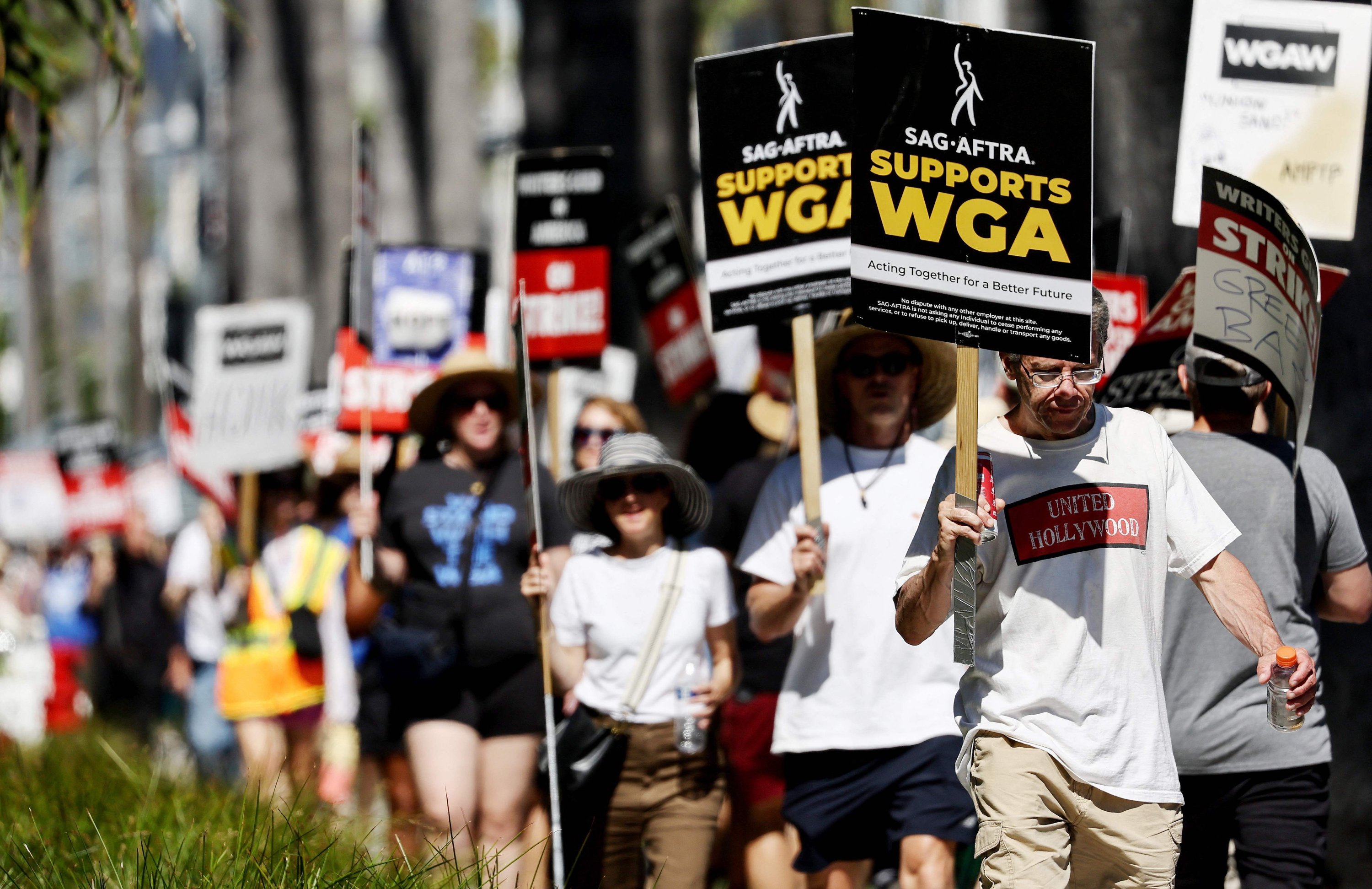Actors And Writers Strike: Hollywood Faces Unprecedented Production Shutdown

Table of Contents
Key Demands of the Writers Guild of America (WGA)
The WGA strike is fueled by several core concerns, primarily centered around fair compensation and improved working conditions in the evolving entertainment landscape.
Fair Wages and Residuals in the Streaming Era
The shift from traditional television models to streaming has drastically altered the compensation structure for writers. Streaming platforms often pay upfront fees but offer significantly reduced or nonexistent residuals, the payments writers traditionally received for reruns and syndication. The WGA is fighting for fairer residuals in the digital age, arguing that the immense profits generated by streaming services should be more equitably shared with the writers who create the content.
- Examples of streaming platform payment structures: Netflix, Disney+, and HBO Max all operate under different models, often lacking the lucrative residual payments of network television.
- Specific examples of WGA demands regarding residuals: The WGA is pushing for a percentage of streaming revenue, similar to what was previously earned through syndication deals.
- The impact of AI on writing and the WGA's concerns: The increasing use of AI in scriptwriting is a major point of contention. The WGA is demanding safeguards against the use of AI to replace human writers.
Working Conditions and Minimum Staffing Levels
The WGA also highlights concerns about excessive workloads and inadequate staffing on productions. The "mini-room" model, where writers are forced to work long hours with limited staff, is a key issue. This impacts the quality of the final product and the overall well-being of the writers.
- Examples of current working conditions deemed unacceptable: Long hours, insufficient breaks, and inadequate resources are frequently cited concerns.
- The link between staffing levels and creative output: Adequate staffing allows for more collaboration, brainstorming, and thorough script development.
- The potential impact on show quality if minimum staffing is not mandated: Reduced staffing can lead to rushed scripts, underdeveloped characters, and a decline in overall creative quality.
Key Demands of the Screen Actors Guild – American Federation of Television and Radio Artists (SAG-AFTRA)
SAG-AFTRA’s strike mirrors many of the WGA’s concerns, particularly regarding fair compensation in the streaming era, but also introduces unique challenges specific to the acting profession.
Fair Wages and Residuals
SAG-AFTRA is fighting for fair wages and residuals, particularly given the significant shift towards streaming. Streaming platforms often offer lower payments compared to traditional television and film contracts, leaving many actors with little to no residual income from their work's continued success.
- Examples of specific demands regarding minimum wages: The union is demanding increases to minimum daily rates and better compensation for streaming projects.
- The impact of self-taping on actor compensation: The prevalence of unpaid self-tape auditions is a major point of concern, as it places the burden of production costs on the actors themselves.
- The use of AI in generating actors’ likenesses and voices: SAG-AFTRA seeks to protect actors from the unauthorized use of their likeness and voice through AI technology.
Protection Against AI and Self-Tape Exploitation
The rise of AI poses a significant threat to actors' livelihoods. The ability to create realistic digital likenesses and voices using AI raises concerns about actors being replaced by technology. The exploitation of actors through unpaid self-tape auditions is another key issue.
- Examples of AI's potential to replace actors: AI can generate realistic performances, raising fears of reduced demand for human actors.
- Concerns over the use of AI to recreate actors’ images/voices: The unauthorized use of an actor's image or voice for AI-generated content is a major concern.
- The unsustainable nature of unpaid self-tape auditions: Actors should not bear the financial burden of production for auditions.
The Impact of the Double Strike on Hollywood
The simultaneous WGA and SAG-AFTRA strikes have resulted in a near-total shutdown of Hollywood production, with wide-ranging economic and creative consequences.
Production Shutdowns and Economic Fallout
The strike has brought countless film and television productions to a halt, resulting in significant economic losses. This impacts not only studios but also numerous individuals and businesses dependent on the industry.
- Examples of major productions put on hold: Numerous high-profile films and television shows have been suspended indefinitely.
- The estimated economic loss due to the strike: The financial impact on the industry and related businesses is substantial and continues to grow.
- The impact on related businesses (catering, transportation, etc.): Businesses that support Hollywood productions are facing significant hardship.
Long-Term Effects on the Entertainment Industry
The long-term effects of this actors and writers strike remain uncertain, but it's likely to reshape the industry significantly.
- Potential changes to streaming contracts and residuals: The strike could lead to fairer compensation models for streaming content.
- Potential for improved working conditions: The strike could result in improved working conditions and better protections for both writers and actors.
- The possibility of new industry regulations: The strike may prompt regulatory changes to address the issues raised by the unions.
Conclusion
The simultaneous strike by the WGA and SAG-AFTRA represents a significant turning point for the entertainment industry. The actors and writers’ demands highlight crucial issues surrounding fair compensation, working conditions, and the ethical use of emerging technologies like AI. The unprecedented production shutdown has far-reaching economic consequences and will undoubtedly shape the future of Hollywood.
Understanding the complexities of the Actors and Writers Strike is crucial for anyone interested in the future of entertainment. Stay informed on the ongoing negotiations and the potential long-term impact of this pivotal moment in Hollywood history. Follow reputable news sources for updates on the actors and writers strike, and learn how you can support the striking actors and writers.

Featured Posts
-
 Sabalenka Claims Madrid Open Title Overpowering Gauff
May 13, 2025
Sabalenka Claims Madrid Open Title Overpowering Gauff
May 13, 2025 -
 Aryna Sabalenka And Coco Gauff Secure Rome Open Wins
May 13, 2025
Aryna Sabalenka And Coco Gauff Secure Rome Open Wins
May 13, 2025 -
 Nhl Draft Lottery A New In Studio Drawing
May 13, 2025
Nhl Draft Lottery A New In Studio Drawing
May 13, 2025 -
 U S Customs Revenue Reaches Record High 16 3 Billion In April
May 13, 2025
U S Customs Revenue Reaches Record High 16 3 Billion In April
May 13, 2025 -
 De Strijd Om De Scudetto Inter Napoli En Atalanta Wedstrijdprogramma En Voorspelling
May 13, 2025
De Strijd Om De Scudetto Inter Napoli En Atalanta Wedstrijdprogramma En Voorspelling
May 13, 2025
